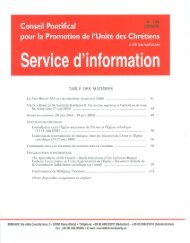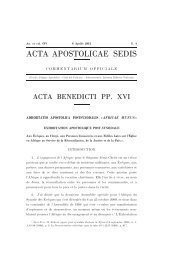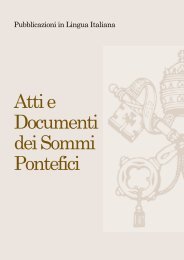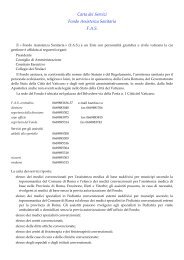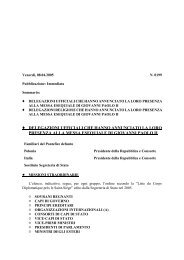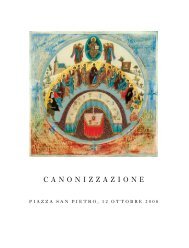ACTA APOSTOLICAE SEDIS - La Santa Sede
ACTA APOSTOLICAE SEDIS - La Santa Sede
ACTA APOSTOLICAE SEDIS - La Santa Sede
Erfolgreiche ePaper selbst erstellen
Machen Sie aus Ihren PDF Publikationen ein blätterbares Flipbook mit unserer einzigartigen Google optimierten e-Paper Software.
Acta Benedicti Pp.XVI 691<br />
guidelines does not seem to have led to significant improvements in the<br />
Diocese of Cloyne until 2009.<br />
(c) Canonical difficulties<br />
The Framework Document correctly recognizes the need to respect both<br />
civil and canon law.<br />
With regard to canon law, it states: “In responding to complaints of child<br />
sexual abuse, Church authorities must also act in accordance with the requirements<br />
of the Code of Canon <strong>La</strong>w and must respect the rights and uphold the<br />
safeguards afforded in that Code both to those who complain of abuse and to those<br />
who are accused.The Church has its own inherent right to constrain with penal<br />
sanctions its members, including priests and religious, who commit offences.<br />
These penal sanctions are clearly indicated in the Code of Canon <strong>La</strong>w”<br />
(cfr. c. 1311ff (pp. [14]-[15]).<br />
Turning to the question of the canonical difficulties alluded to by the<br />
Congregation for the Clergy, it should be pointed out that since both canon<br />
and civil law hold to the principles that everyone has a right to his or her<br />
good name and that an accused person is presumed innocent until proven<br />
guilty, both ecclesiastical and civil authorities rightly insist on the necessity<br />
of due process and respect for the basic rights of all the parties involved. In<br />
addition, the Congregation itself is bound by canon law and has no power to<br />
modify it. Hence, whatever observations the Congregation made in relation<br />
to the Framework Document had to take into account the canonical norms<br />
then in force. As explained below, in order to respond more effectively to the<br />
problem of child sexual abuse, important changes were introduced to the<br />
relevant canonical legislation from 2001 onwards.<br />
While the Framework Document does recognize the need for compatibility<br />
with canon law, the Congregation for the Clergy — as Archbishop Storero’s<br />
letter explains — noted that the definitive text of the Framework Document<br />
contained procedures and dispositions which appeared contrary to canonical<br />
discipline. In pointing this out, the Congregation did not reject the Framework<br />
Document. Rather, it offered advice to the Bishops with a view to ensuring<br />
that the measures which they intended to apply would prove effective and<br />
unproblematic from a canonical perspective. For this reason, the Congregation<br />
drew attention to the requirement that these measures should be in<br />
harmony with canonical procedures in order to avoid conflicts that could<br />
give rise to successful appeals in Church tribunals. The Holy See, in recognis-



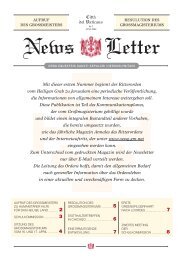
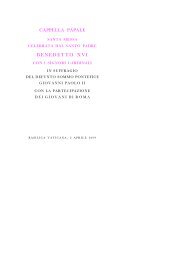
![AAS 01 [1909] - La Santa Sede](https://img.yumpu.com/51456523/1/180x260/aas-01-1909-la-santa-sede.jpg?quality=85)
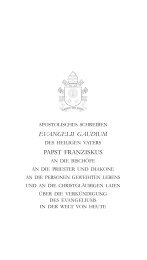
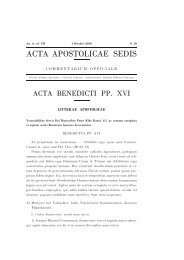
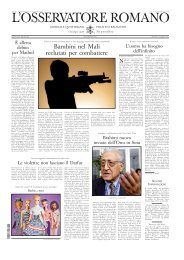
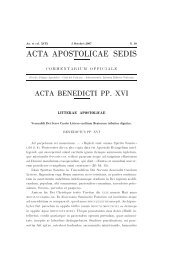
![AAS 20 [1928] - La Santa Sede](https://img.yumpu.com/19772818/1/180x260/aas-20-1928-la-santa-sede.jpg?quality=85)
